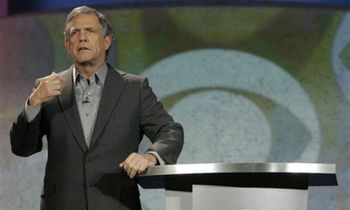CBS’s Post-Moonves Future Could Include Sale, Viacom

The smarter way to stay on top of the multichannel video marketplace. Sign up below.
You are now subscribed
Your newsletter sign-up was successful
There are big changes ahead for one of the Big Four broadcasters.
For more than 20 years, CBS Corp. was personified by chairman and CEO Les Moonves, booster of broadcast, programmer par excellence, streaming pioneer and, as it turned out, boardroom brinksman and sexual harasser.
With Moonves forced out by a controlling shareholder and the #MeToo movement, the future of CBS might be more complicated than one of Moonves’s shows, in which the identities of the hero and villain were clear and the plot wrapped up in 60 minutes. (Speaking of 60 Minutes, the executive producer of CBS’s acclaimed newsmagazine was also fired last week. More on that below.)
With a leadership vacuum left behind by a very hands-on chief, the two most likely scenarios involved CBS being merged with Viacom or sold to another owner.
Moonves, one of the highest paid executives in the country, had opposed suggestions by CBS vice chairman Shari Redstone’s that CBS consider a combination with Viacom, also controlled by National Amusements, the family holding company set up by ailing 95-year-old Sumner Redstone.
Taking the Pledge
To fight off the Redstones, CBS attempted to dilute their voting rights. The lawsuit that ensued was settled in an agreement that included the departure of Moonves, new directors being named to the CBS board and a pledge by National Amusements not to suggest a merger with Viacom for two years.
The smarter way to stay on top of the multichannel video marketplace. Sign up below.
Despite the standstill agreement, there are those who still think that with Moonves gone, a combination with Viacom is inevitable.
BTIG analyst Rich Greenfield noted that while National Amusements agreed not to propose a CBS-Viacom transaction, that doesn’t mean it wouldn’t support one if the two companies’ boards reach terms.
One of the big issues making combining CBS and Viacom difficult was management. Moonves would have been the top dog and he didn’t want Viacom CEO Bob Bakish involved with the new company. With Moonves out of the picture, the Redstones can first pick a new CBS CEO and then decide whether that exec or someone from Viacom would run the companies if they were combined.
The other issue was the price: how many CBS shares would Viacom owners get?
While CBS seemed to think that Viacom’s cable networks were an albatross that would weigh it down, Greenfield thinks the Redstones would be smart to consolidate their media assets.
Weighing a Viacom Deal
“We continue to believe a merger between Viacom and CBS offers substantial value creation in terms of revenue synergies, cost savings and balance-sheet strength; we believe the independent directors will agree,” Greenfield said.
For CBS, there are few alternatives, he added. “We simply do NOT see a buyer for CBS beyond Viacom.”
After hitting a low of $54.04 in early trading Monday (Sept. 10), CBS shares bounced back to close at $55.85 on Friday. Viacom had a roller coaster ride, starting at $29.35 on Monday and trading as low as $28.84 on Wednesday before closing at $29.85 on Friday.
Others think any Viacom deal is dead. Sanford Bernstein media analyst Todd Juenger upgraded CBS stock because the chance of a re-merger with Viacom is “near zero” and the possibility that CBS gets sold has significantly increased.
“The management vacancies, need to cleanse the culture, and the agreement to remove the Redstone Trust provision which impedes an asset sale all make the sale of CBS that much easier and more likely (perhaps even necessary),” Juenger said.
The CBS culture appears to need cleansing because in addition to Moonves, Jeff Fager, the executive producer of 60 Minutes and former chairman of CBS News, was also fired. He too had been charged with misconduct with female staffers, but lost his job when he threatened the CBS reporter who was covering his case that she would be harmed if she wasn’t careful with what she reported.
CBS’s problems made it harder for Viacom to focus Wall Street on Bakish’s pitch that he’s turning the cable programmer around.
During a presentation to an the annual Goldman Sachs Communacopia conference last week, Bakish didn’t mention CBS. But afterwards, he was peppered with questions about CBS by CNBC’s David Faber.
Bakish said it’s “easy to get distracted” by the CBS goings-on, but that he focus was on “delivering a turnaround, delivering an evolution.” He pointed to improvements in distribution revenue, audience share and the financial results at Paramount Pictures. But Viacom’s stock price is capped by the potential of a deal with CBS, Faber noted.
“It’s definitely frustrating,” Bakish said. “We are focused on putting points on the board ... I think we’ll get respect for that.”
MoffettNathanson Research media analyst Michael Nathanson said he expects CBS and Viacom to be talking merger a year from now. With time, CBS’s board will have a better idea of how real Bakish’s turnaround is and how Viacom fared in its critical affiliate-fee negotiation with DirecTV.
CBS stock should be higher in 2019. It has the Super Bowl, the chance to increase retrans fees with 75% of its footprint due for renegotiation over the next two years, and some syndication opportunities.
“At that point, we would expect Viacom and CBS to finally consummate their long-anticipated marriage at terms that are more favorable to CBS than earlier,” Nathanson said.
Jon has been business editor of Broadcasting+Cable since 2010. He focuses on revenue-generating activities, including advertising and distribution, as well as executive intrigue and merger and acquisition activity. Just about any story is fair game, if a dollar sign can make its way into the article. Before B+C, Jon covered the industry for TVWeek, Cable World, Electronic Media, Advertising Age and The New York Post. A native New Yorker, Jon is hiding in plain sight in the suburbs of Chicago.

